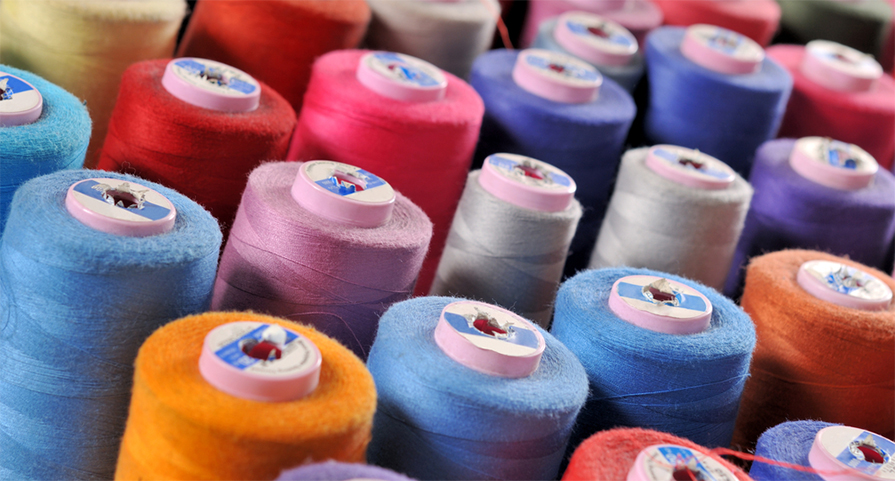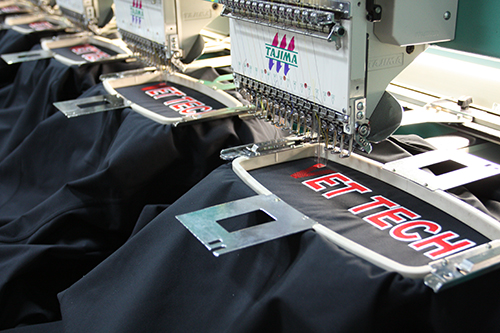
When you're considering custom t-shirts and other gear, you may find it difficult to choose between embroidery or print options.
Both embroidery and screen printing are used to apply your logo or design to clothing, and each can be well-suited to produce beautiful, high-quality results.
Embroidery involves stitching threads directly onto the fabric. While they resemble the hand-stitched embroidery of the past, today's embroidered t-shirts are produced by advanced computerized embroidery machines that perfectly replicate your design. Our commercial embroidery machines offer a wide range of thread colours, so you can enjoy colourful and bright embroidery designs.
When you send us your designs, we digitize them in order to represent the logo or image graphically. This file directs the embroidery machine, telling it what to stitch and where to produce your custom-printed clothing.
On the other hand, screen printing involves the application of ink through custom mesh screens directly on your t-shirts or other custom-printed apparel. Each colour that is part of the image will have its own mesh screen, and the range of colours and printing techniques available is nearly infinite.
Both techniques can produce beautiful, customized apparel that represents your brand or design well. However, there are a few factors that you should keep in mind to help you decide which option is a better choice to customize your clothes.
Colour Matching and Choices
When deciding which product is better suited for your custom shirts, you might want to consider your colour needs. For some items, you may wish to show them in red, green, blue or orange, but the specific shade is not particularly critical. However, for other tees, the specific colors are essential for brand identity or the integrity of the artwork. The level of precision that you need in colour matching can help you make a decision about the type of design application to use.
Embroidery uses stock threads, and there are a number of colours available. Entripy makes use of Isacord threads, a global standard, and Tajima embroidery machines, industry-leading equipment, to produce precise, detailed embroidery. We have a wide range of thread colours available, but the colour choices are limited to these threads. Thanks to the breadth of colours available, you may be able to find the perfect choice among our embroidery threads.
However, due to the blendable nature of inks, there are nearly infinite colour choices in prints available as well. We offer a wide range of stock inks, identified by Pantone colours. However, if you need a precise replication of a specific Pantone colour, this is fully possible with inks. We offer custom colour matching that can precisely replicate the specific Pantone colours used in your logo or design. When colour precision to brand standards is a must, ink can be a better option.
Level of Detail in the Artwork
Some types of artwork are particularly well-suited to specific decoration styles. If you have large, bold color areas or small, tiny details, printed garments may be a better choice to properly represent your image. On the other hand, if you have a simple, defined logo design, embroidery may be an excellent option.
Embroidery is best suited for smaller areas of customized t-shirts. If the design is quite large, it can look beautiful in printed inks, but embroidery of this size can stretch the garment and distort the appearance of the graphic.

In addition, very detailed images are also better suited for printing. Tiny text or other details can be replicated precisely through screen printing, but because embroidery makes use of threads with a certain weight and thickness, the nature of the medium does not accurately reproduce this level of detail.
On the other hand, for compact, clear designs, the textured feel of custom embroidery can add an element of quality and elegance that can make custom-printed apparel stand out and be kept for years on end.
Garment Suitability
The type of shirts, custom hats or other apparel that you are printing can play a significant role in choosing the right type of decoration. For example, a thin t-shirt may start to pucker when embroidery is applied, but a polo shirt provides a good balance for the heavier weight of embroidery. Many people perceive embroidery on polo shirts or button-up shirts to be more prestigious and durable, and it is typically a preferred option for these types of custom garments.
In addition, custom baseball hats are well-suited for embroidery. The weight and thickness of the cap mean that embroidery shows up well and lends a sense of permanence to the item.
On the other hand, many people prefer thinner, lighter t-shirts. Higher-end shirts that conform to the body are particularly well-suited for printing rather than embroidery. Graphic or printed shirts show off your logo or artwork and keep the soft, fitted look of the shirt in place. Embroidery applied to these kinds of shirts can pucker or weigh down the garment overall, causing it to lose its flattering fit and feel. In addition, many people who choose custom t-shirts want to present an "all-over" image that is better suited to custom screen printing.
Overall Aesthetic
The choice of screen printing or embroidery can also reflect your overall aesthetic. If you're looking for a sharp, modern or creative image, screen printing may be ideal for your needs, especially if you are opting for casual garments. On the other hand, if you are looking to convey an image of tradition, reliability or quality, embroidery might be the better choice, particularly if you are opting for heavier items like polo shirts or caps.
There are always exceptions, of course; a creative, unusual embroidered design could spark particular interest, and a large logo for a traditional firm may be best rendered through screen printing.

The options don’t just stop at screen printing and embroidery. Heat transfer and digital print are also great options depending on the type of artwork, quantity, material, and colours. Heat transfer is a decoration method where a high-quality digital paper is applied onto a garment using a heat press. Heat transfer is great for smaller orders or orders with personalizations. Digital printing is when a printer applies ink directly onto the garment using inkjet technology. This is a very precise way of printing images with multiple colours or photo-realistic designs.
If you're still having difficulty deciding between screen printing or embroidery, don't hesitate to reach out to us via live chat, email or phone. Our experienced designers will provide advice and guidance based on your specific needs, taking into account your colour choices, graphic artwork and preferred garments.







